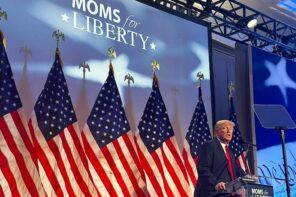Texas Governor Rick Perry has organized a prayer meeting to call on Jesus because, Perry says, “some problems are beyond our power to solve.” The website of “The Response—A call to prayer for a nation in crisis” (set for August 6 in Houston), names some of those unsolvable problems: “financial debt, terrorism, and a multitude of natural disasters.”
One of the endorsers for Gov. Perry’s event is historical document collector David Barton, who often cites the Founding Fathers in attempts to legitimate his central thesis that the United States is, and was intended to be, a “Christian Nation.” Surely, then, he would approve of the advice I propose to Gov. Perry: In calling for heavenly solutions to earthly problems, the governor might appreciate the observations of our second president, John Adams. Hearing this, a disciple of Mr. Barton might nod approvingly, and point out that Gov. Perry is indeed following the example of President Adams by calling for a national time of fasting and prayer, events President Adams endorsed in 1798 and 1799.
While it is true that Adams declared these national fasts, he later regretted it, telling good friend, Benjamin Rush, “The National Fast, recommended by me, turned me out of office.” Whether Adams fell from favor over a prayer day is a matter of historical dispute. However, it is quite clear that Adams reevaluated his support for religious declarations. Gov. Perry and the rest of us can take a lesson from Adams’ hindsight.
On June 4, 1812, Benjamin Rush had written to John Adams with news of a motion made at the General Assembly of the Presbyterian Church to petition the President to declare a national fast in advance of impending war with Great Britain. To Dr. Rush’s dismay the motion was defeated by the delegates. Lamenting the lack of a national fast, Rush reminded Adams of his support for one during the revolution, in the face of opposition from Thomas Jefferson.
Adams’ reply to Rush just days later on the 12th of June must have surprised his revolutionary compatriot. Instead of calling again for a national fast, Adams blamed it for his political demise in 1800 explaining that:
It was connected with the general assembly of the Presbyterian Church, which I had no concern in. That assembly has allarmed and alienated Quakers, Anabaptists, Mennonists, Moravians, Swedenborgians, Methodists, Catholicks, protestant Episcopalians, Arians, Socinians, Armenians, &c, &c, &c, Atheists and Deists might be added. A general Suspicion prevailed that the Presbyterian Church was ambitious and aimed at an Establishment as a National Church. I was represented as a Presbyterian and at the head of this political and ecclesiastical Project. The secret whispers ran through them [all the sects] “Let us have Jefferson, Madison, Burr, any body, whether they be Philosophers, Deists, or even Atheists, rather than a Presbyterian President.” This principle is at the bottom of the unpopularity of national Fasts and Thanksgiving. Nothing is more dreaded than the National Government meddling with Religion. This wild Letter, I very much fear, contains seeds of an Ecclesiastical History of the U.S. for a Century to come.
Ever the prognosticator, Adams’ prediction that his letter contained “seeds of an Ecclesiastical History of the U.S.” seems modest, as his seeds are still vital some two centuries later. Gov. Perry’s national call to prayer and fasting has triggered no small amount of protest, including from the atheist/agnostic Freedom from Religion Foundation, which is suing to stop it. Religious groups like the Houston Clergy Council are also concerned about the event, arguing that “…the governor has made it clear that only Christians of a particular kind are welcome to pray in a certain way. We feel that such an exclusive event does not reflect the rich tapestry of our city.”
Jewish state representative Elliott Naishtat (D-Austin), who has been especially critical, told me that “Perry’s Prayer Summit is unlike other events in this country, such as National Prayer Days, which almost always include all faiths,” adding that “the event can only serve to put people into religious boxes that decrease the chances that there will ever be public acceptance of different groups and faiths.”
Nearly all who feel left behind by The Response point to the funding source as evidence of its exclusive nature: the American Family Association. The AFA’s Bryan Fischer has said that Native Americans were “morally disqualified” from holding their lands because of savagery and immorality; that gays in the Nazi military were responsible for “six million dead Jews”; that the First Amendment only applies to Christians (which is his basis for preaching that Muslims do not have the right to build mosques). In short, Governor Perry is partnering with an organization that believes that only Christians have the right to freely exercise their religious beliefs. After examining the views of The Response organizers, John Adams’ words bear repeating: “Nothing is more dreaded than the National Government meddling with Religion.” Indeed, the sitting governor of Texas and his prayer partners appear to be meddling and have declared that the nation needs their god above all others; naturally, this offends. Like other critics Rep. Naishtat objects to the involvement of the AFA saying, “Jews, Muslims, Mormons, and Hindus, as well as Catholics and gays, would feel extremely out of place and unwelcome at any so-called national day of prayer and fasting organized and sponsored by the American Family Association.”
David Barton argues that today’s opponents of state-sponsored Christian favoritism are ignorant of the nation’s historic Christian roots. What we learn from Adams’ critics, however, is that from the earliest days Americans have been deeply suspicious of government endorsement of one religious perspective over another. Viewed in the light of Adams’ analysis, it seems that current resistance to The Response is a deeply American impulse.
In Adams’ day, critics were “alarmed and alienated,” fearing the official favor of one religious dogma over others. In the present day, critics are calling the event divisive since the event is endorsed and funded by groups that have made headlines for maligning other social and religious groups. Given the narrow sliver of Christianity represented by the organizers, it appears the critics have a point.
Another governor from Texas liked to say that he was a “uniter not a divider.” Perry, perhaps wanting to distinguish himself from George W. Bush in advance of a run at the presidency, is positioning himself as the opposite. And while the governor may find rousing support from his peers in the coming days, declaring to the nation in a presidential race that our problems can only be solved by a narrowly-conceived conservative protestant Jesus will, I suspect, court the suspicion and resistance experienced by John Adams. For his own good as well as the good of his constituents, Perry should take some wisdom from a Founding Father and call the whole thing off.




